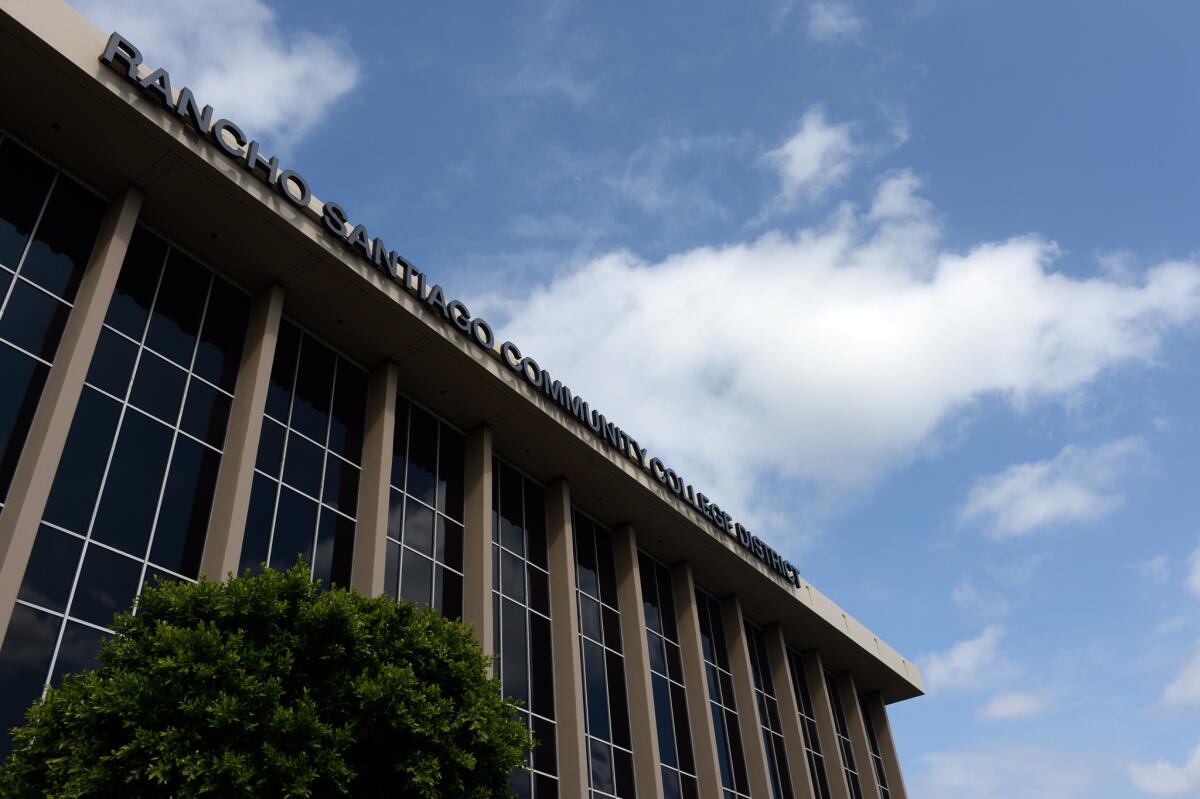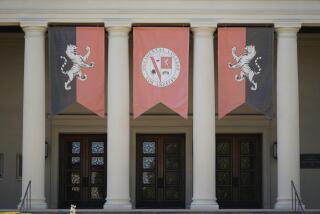O.C. college district foundation closer to OKing Saudi consulting deal

The Rancho Santiago Community College District’s proposed deal to operate two schools in Saudi Arabia has been criticized by faculty members and others who say that it was brokered in near secrecy and who question doing business with an absolute monarchy with a spotty human rights record.
- Share via
An Orange County college district foundation Tuesday moved closer to approving a controversial consulting contract worth an estimated $85 million to help run two technical schools in Saudi Arabia.
The proposed deal has been criticized by faculty members and others who say that it was brokered in near secrecy and who questioned doing business with an absolute monarchy with a spotty human rights record.
During a board meeting Tuesday afternoon in Santa Ana, the Rancho Santiago Community College District Foundation directed attorneys to return with a final draft of the contract for final approval, which officials say could happen within 30 days.
For months, some faculty members have complained the project has been cobbled together in violation of the Brown Act, the state’s open meeting law. Separately, two nonprofit organizations, the Anti-Defamation League and the Zionist Organization of America, have sent letters expressing concerns about operating schools in Saudi Arabia, where schools are segregated by gender, among other things.
Chancellor Raul Rodriguez said he hopes revenue from the deal, or others like it, will help support district projects and student programs.
“This is our business model that we’re trying to follow and who knows if we’ll be successful, but we’re trying,” he said.
“I guess we picked the wrong country to start with,” he added, jokingly.
Critics said the board kept the project under wraps until Barry Resnick, president of the district’s faculty association, and others started asking questions. District officials acknowledge that there were violations of open meeting laws that they had to rectify.
A review of the board’s minutes and agendas over the last two years show that although the board often discussed student recruitment projects in countries such as China, there was scarcely any mention of the Saudi Arabia project until recently. District officials said there was initially confusion about whether the open meeting law applied to the district’s foundation, a nonprofit.
“The decision previously was that it didn’t apply,” said Robert Feldhake, a foundation attorney. “We advised it did and corrective steps were taken.”
According to records, the first mention of something involving Saudi Arabia was made in March 2014 in a reference to a planned trip to San Francisco by Rodriguez and another board member. The next mention happened a year later, in March, when Resnick asked about the project during a board meeting.
On May 12, in an effort to correct the violations of the open meeting law, the board publicly approved a series of items related to the project, including payments, a February consulting contract and January agreement letter signed by Rodriguez, who is also a foundation board member.
Jessica Levinson, a professor at Loyola Law School who specializes in good governance, said even if it was an honest mistake there are consequences to violating open meeting laws.
“The public is injured when there is a Brown Act violation like this,” she said. “The public is deprived from taking part in their government’s decisions.”
The contract presented at Tuesday’s meeting was a slimmed-down version of the original agreement, which was expected to produce an estimated $105 million in revenue for the foundation over five years. Officials say the new contract reduces that amount by $20 million.
Rodriguez said that under the previous contract, the foundation would have been responsible for making upgrades at the Saudi Arabian schools, such as by installing elevators and setting up Wi-Fi networks. That no longer will be the case, he said.
Rodriguez said that the district’s primary role in Saudi Arabia would be to consult, help train faculty and set curricula for the two all-male schools.
During the meeting Tuesday, Feldhake said that the college district itself would not face a liability from the deal, as critics have said. He also said a provision in the contract would ensure that federal and state laws were not broken by operating schools in Saudi Arabia.
But Resnick said officials should seek an independent legal opinion.
“Do you really think an action brought in a California court would not name the district as well as the foundation?” he said.
Some board members said they stood by the deal.
“Isolation and barriers do nothing to build bridges across cultures or effect change,” said board member Arianna Barrios. “The foundation’s project with Saudi Arabia promotes education, cultural understanding and will facilitate progressive change.”
Todd Litfin, another board member, said he supported the proposed contract because the college district can use the financial boost.
“I work in government and I’m acutely aware of state finances ... and I know the future is bleak,” Litfin said. “So any effort in which the district can get some financial benefit from this type of arrangement is positive because the dark night for California is coming and people on the local level better have backup plans or alternative sources of revenue.”
Twitter: @latvives
More to Read
Sign up for Essential California
The most important California stories and recommendations in your inbox every morning.
You may occasionally receive promotional content from the Los Angeles Times.











